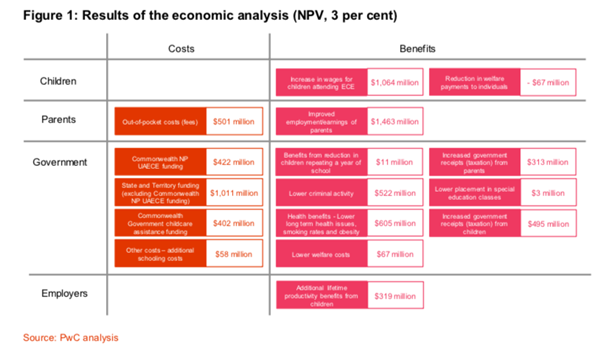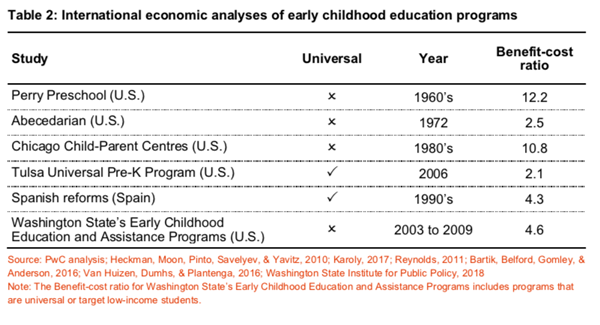There’s a new economic analysis of the benefits high quality early childhood education in Australia.
The organisation behind the analysis is The Front Project, a small national body based in Melbourne with some clearly defined tasks which include:
Activating a network of influential business and community leaders to boldly advocate for high quality early learning.
What is The Front Project?
The Front Project is described as an ‘independent national enterprise’ and led by high profile social entrepreneur, CEO Jane Hunt. As the winner of the Schwab Foundation Social Entrepreneur Award in 2012, Ms Hunt is granted an ongoing seat at World Economic Forum events and in January this year she spoke to the WEF on the topic of early learning and knowledge economics.
You can read more about Jane and about The Front Project’s board members here, and find out more about its initiatives like The Apiary Fellowship, economic analysis, and its workforce strategy activities in Future Tracks.
Connecting ECE and business
The Front Project actively recruits businesses into a network where representatives connect to learn about and, ultimately, advocate for quality early learning. This means a two-way connection. It provides business people in its network with information such as the recent economic analysis, so business people are empowered to:
- Engage with your networks on the importance of policies that support children and families
- Use your influence and help policymakers and other leaders understand the economic impact of quality early childhood education
- Work with us to write op-eds, and blogs that highlight the impact of quality early learning on children, families, business and the community
- Engage with parents and families in your own organisation and share information on the importance of the first five years
Source: thefrontproject.org.au/business
PwC analysis
As you’ll read in more detail elsewhere on Amplify today, The Front Project commissioned PwC (formerly Price Waterhouse Coopers) to conduct the first comprehensive Australian analysis of the economic benefits of quality early childhood education. Titled A Smart Investment for a Smarter Australia, the report is an important piece of work for the whole sector – on par with the Brennan & Pascoe Lifting Our Game Report.
From this analysis, we can all say with confidence that in Australia every $1 spent on quality early learning returns a $2 investment to government and the community. According to Ms Hunt’s release at the report launch, this is a better return on investment (ROI) than many nation-building infrastructure projects.
This figure was generated by taking the known benefits of children experiencing quality early childhood education – such as lower obesity, lower smoking rates, and higher school retention – and crunching that data with the costs that arise both from providing ECE, such as government subsidies, and the costs of not providing enough quality ECE, such as lost productivity when parents can’t work, and the price of remedial programs for the social problems early learning can minimise or prevent.
So part of the calculation is what is saved by providing more and higher quality early learning, like needing fewer dollars to spend on obesity related health programs, and another part is looking at what is created by providing more and higher quality early learning, like producing healthier adults who have completed higher levels of education tend to earn more money in their lifetimes, which means they will contribute more to the economy and pay more in taxes.
A lifetime of benefit
And of course the benefits don’t all happen at once, and they are spread across different groups.
• Children – $997 million or 21 per cent of benefits
• Parents and carers – $1.46 billion or 31 per cent of benefits
• Governments – $1.96 billion or 41 per cent of benefits
• Employers and businesses – $319 million or 7 per cent of benefits
Source: A Smart Investment for a Smarter Australia
A graphical representation of the results of the economic analysis is below.

Wait! Only $2?
If you’ve been around the sector for a while, you’ve seen quite a few figures demonstrating the economic benefit of ECE investments.
Most of those quoted by pro-ECE advocates have, in the past, held up a return on investment somewhat higher than $2 – as high as $7 for a $1 spend, in some cases.
This table from the PwC report shows some of the past studies that were reviewed for the analysis.

Should we really welcome a report that only proves a $2 return for $1 invested?
Evidence base
Yes, we really should and for at least four reasons.
Firstly, this is a current Australian study by a well-known independent research organisation. Critics of investment in ECE – and you only have to read the right newspapers to find them – have in the past often torn down claims of early learning benefits because the evidence comes from very poor American neighbourhoods, or from countries with few parallels to Australia’s subsidised system.
Secondly, in a similar vein, critics have too often been able to dismiss studies promoted by Australian advocates as being out of date and carrying the flaws borne more heavily by many pre-digital era studies – limited data sets, inherent researcher bias, and so on.
Thirdly, any positive outcome to the costs of ECE should immediately turn the discussion about ECE funding to the language of investment rather than ‘handout’.
And finally, the very modesty of ‘only’ proving a $2 for $1 return on investment could be a strong factor in swaying some policy makers across the line as we look once more at the pressing need for two years of universal access for all Australian children to two years of quality preschool education. It’s a conservative, evidence-based figure that we all need to learn by heart.
About CELA
Community Early Learning Australia is a not for profit organisation with a focus on amplifying the value of early learning for every child across Australia - representing our members and uniting our sector as a force for quality education and care.